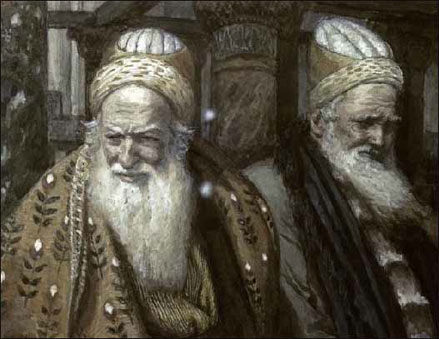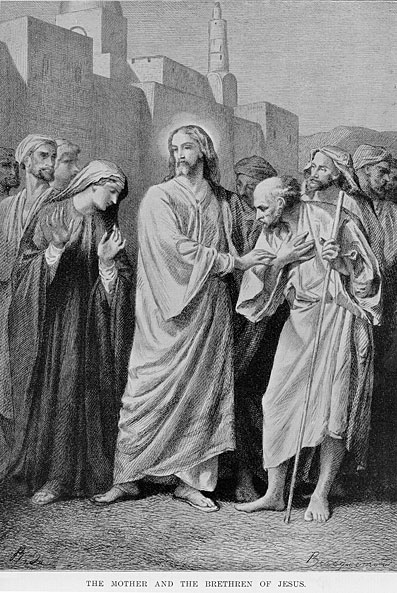Dec
17
2009

On the AV forum, full-pret Dave asks a good question:
“Since your view distinguishes between the parousia of AD70 and a future return of Christ at ‘the end’, when Christ and the apostles taught about the ‘Second Coming’ (yet to occur), what did they call that event?”
Continue reading
6 comments | tags: Against Hyperpreterism | posted in Against Hyperpreterism, Biblical Theology, The Last Days
Dec
17
2009
“Biblical concern for the poor and the oppressed is manifested through the actions of the church, not through the state. Liberalism, however, has always insisted that statist action, not ecclesiastical action, is the remedy, thus aligning itself with the Beast against the Bride. This is no small matter.”
— James B. Jordan, “The Moral Majority: An Anabaptist Critique” (a review of Robert E. Webber’s The Moral Majority: Right or Wrong?) in Christianity & Civilization #1: The Failure of American Baptist Culture. [PDF]
Comments Off | tags: Culture, James Jordan, Politics | posted in Quotes
Dec
16
2009

or Cooking the Golden-Egg Goose
Gary North has a free course on reducing your debt. Part of the plan is an application of the 5-point Covenant structure. Basically, God calls a man, gives him a job to do, and returns at the end to assess the man’s work. North refers to the parable of the talents in Matthew 25:
Continue reading
2 comments | tags: Dominion Theology, Economics, Gary North, Herod, Revelation, Worship as commerce | posted in Biblical Theology, Christian Life, Quotes, The Last Days
Dec
15
2009
Blood Shed for Bloodshedders

“Now thanks be to God who always leads us in triumph in Christ, and through us diffuses the fragrance of His knowledge in every place. For we are to God the fragrance of Christ among those who are being saved and among those who are perishing. To the one we are the aroma of death leading to death, and to the other the aroma of life leading to life.” 2 Cor. 2:14-16
For those who questioned whether the image of Day 5′s swarms corresponds to the clouds of incense as armies of God, Paul himself does it in 2 Corinthians 2.[1] The saints are soldiers who wield the two-edged sword of the gospel. It brings both life and death, depending on whether those warned respond like Rahab or not. Which brings me to my point.
Doug Wilson recently posted about the sacraments being promises of salvation.
“Every sacrament, by definition, contains and manifests a promise of salvation. That is what a sacrament is. The sacrament of baptism contains a promise of salvation at its inception, and the Supper contains a promise of salvation related to perseverance. What God began God will complete. These promises are apprehended with the heart, whenever someone receives them in faith.”
There is much he wrote that I agree with, but what he said highlighted the major difference between paedo- and credobaptism. Here’s my response for what it’s worth. It does repeat some things I have posted elsewhere here, but it might make my position clearer to some, and the reasons for it. It’s not an argument I’ve seen used by credobaptists, so it might be of interest to you. Continue reading
3 comments | tags: Baptism, Doug Wilson, Joshua, Systematic typology | posted in Biblical Theology
Dec
14
2009

“And when they shall say unto you, Seek unto them that have familiar spirits, and unto wizards that peep, and that mutter: should not a people seek unto their God? for the living to the dead?” Isaiah 8:19
I remember reading this verse for the first time in the KJV and wondering what it was exactly that the wizards were peeping at!
Continue reading
Comments Off | tags: Bible Matrix, Christmas, Feasts, Hebrew, Isaiah | posted in Biblical Theology
Dec
12
2009
 An interesting excerpt from James Jordan’s review of Wayne House and Thomas Ice’s, Dominion Theology: Blessing or Curse?: An Analysis of Christian Reconstructionism
An interesting excerpt from James Jordan’s review of Wayne House and Thomas Ice’s, Dominion Theology: Blessing or Curse?: An Analysis of Christian Reconstructionism
The quietist is committed to inaction. The pietist, by way of contrast, is frequently active in social and charitable affairs, but what makes his position inadequate is that pietism is in general uninterested in social theory. (In general, pietist movements are not much interested in theology either.) There is no self-conscious reflection on the concerns of political philosophy in the broad sense. It is simply a matter of “doing good” here and there, without reflection. This is not bad, but it does not go far enough.
Continue reading
2 comments | tags: Dispensationalism, James Jordan, Philosophy, Pietism, Secular humanism, Theonomy | posted in Quotes
Dec
11
2009

“Paul knew his kinsmen. This is a group of people on whom this tactic would work.”
Doug Wilson has been preaching through Romans (subscribe to his podcast now!) and recently commented on his blog about Romans 11, and the relationship between Christians and Jews today.[1] I’ll have to listen to his sermon to figure out whether Doug sees this as interpretation (“all Israel” is yet to be saved), or application.
I made some comments and a gent called Lemuel replied, and I made some more. It brings out the significance of the phrase “the sons of God.”
Continue reading
1 comment | tags: AD70, Circumcision, Compromise, Doug Wilson, Galatians, Gary DeMar, Judaisers, Noah, Romans, Ruth | posted in Biblical Theology, The Last Days
Dec
10
2009

Ending the False Dichotomy of Blood and Spirit
NOTE: THIS POST HAS BEEN REMIXED AND INCLUDED IN GOD’S KITCHEN.
The Old Testament is a bloody book. Beginning with Adam’s “dissection” to build Eve and the animals the Lord made into tunics, it culminates in Revelation with the massacre of saints under Herod/Nero (Revelation 14) and then the massacre of Jews under Vespasian and Titus.
Continue reading
2 comments | tags: Amillennialism, Church History, Dispensationalism, Jewish war, John Piper, Martyrdom, Nero, Postmillennialism, Revelation | posted in Biblical Theology, Quotes, The Last Days
Dec
10
2009

or The First Shall Be Last
Yesterday’s post concerning Jesus’ message to John had some discussion about lepers becoming New Covenant priests. Those who were condemned to live outside were made clean and invited in. Of course, there is Jesus’ own condemnation of those who watched harlots and tax collectors enter the kingdom but defiantly stood outside themselves.
Right up until the end of the Jewish war, the Jewish leadership got their clean and unclean, their inside and outside, more and more wrong. The gospel turned their world upside down–or, in fact, rightside up.
John Barach observes how Mark applies this to Jesus’ own family using literary structure: Continue reading
Comments Off | tags: John Barach, Literary Structure, Mark | posted in Biblical Theology, Quotes, The Last Days
Dec
9
2009
Jesus built a new Tabernacle before He tore down the old one that was ready to pass away. This is the basis of His message to John in prison:
Continue reading
Comments Off | tags: Acts, Bible Matrix, Jericho, John the Baptist, Kelby Carlson, Paul, Tabernacle, Trumpets | posted in Biblical Theology, The Last Days

































